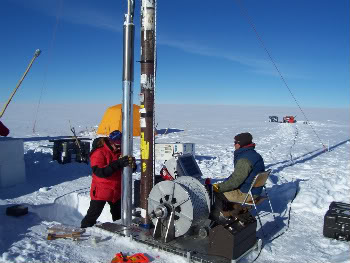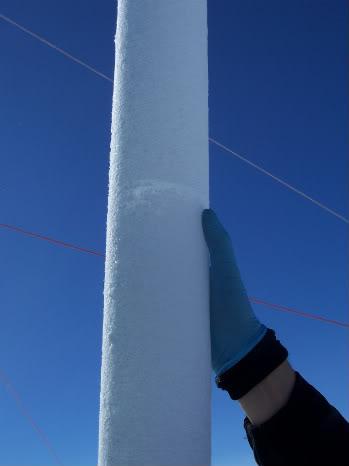|
|
The burning of fossil fuels has disrupted the nitrogen cycle by altering that amount of nitrogen in the biosphere, according to scientists from Brown University and the University of Washington. It has long been known that fossil fuel combustion releases nitric oxides into the air—which combine with other elements to form both smog and acid rain—but until now scientists have been unsure as to the extent nitric oxide emissions have affected the natural nitrogen cycle.
In a study published in Science researchers were able to trace nitrates to their source: nitric oxide produced by fossil fuels. Scientists examined two isotopes of nitrogen found in nitrates from a Greenland ice core. Recovered in 2006, the 100-meter-long core showed a record number of nitrates starting in 1718, corresponding with the beginning of the Industrial Revolution.
 Meredith Hastings and Bella Bergeron drill an ice core in Greenland. Photo courtesy of Meredith Hastings and Julia Jarvis. |
“What we find is there has been this significant change to the nitrogen cycle over the past 300 years,” said Meredith Hastings, the paper’s lead author. “So we’ve added this new source — and not just a little bit of it, but a lot of it.”
The study found that the ratio of nitrogen-15 isotopes to nitrogen-14 isotopes, which is more common, has changed due to humans burning fossil fuels. The largest shift in the nitrogen isotope ratios occurred from 1950 and 1980, according to the scientists, a time when fossil fuel emissions rose significantly.
“The only way I can explain the trend over time,” Hastings said, “are the nitric oxide sources, because we’ve introduced this whole new source — and that’s fossil fuels burning.”
The study also tackles a question regarding changes in lake chemistry, finding that fossil fuel burning has even affected far-flung lakes.
 Greenland ice core. Photo courtesy of Meredith Hastings. |
“Sediment cores in Arctic lakes show that there have been significant 20th-century declines in the nitrogen isotopic composition of organic nitrogen,” said Eric Steig from the Department of Earth and Space Sciences at the University of Washington. “It’s been unclear whether these are due to changes in the lake biogeochemistry or to the direct effect of changes in the isotopic composition of the incoming nitrate from the atmosphere. Our study makes it clear that it is primarily the latter.”
Next up, the researchers hope to determine how individual sources, both natural and human-caused, of nitric oxides are affecting the ratio between nitrogen-14 and nitrogen-15. Natural sources include lightning and bacterial fixing of nitrogen, whereas human-related sources are the burning of fossil fuels and biomasses.
“For example in Narragansett Bay, we could distinguish between nitrogen caused by sewage overflows or vehicular pollution, power plants, fertilizers, or other sources and know how to attack the problem,” Hastings said. The difficulty comes in identifying the true cause of the nitric oxide, since nitrogen isotopic ratios can be altered by a number of different factors.
Finally, the researchers hope to turn to climate change. By quantifying the natural sources of nitric oxides, the scientists believe they could begin to uncover how climate change is affecting the nitrogen cycle.
Related articles
Newly discovered ocean bacteria fixes nitrogen instead of carbon
(11/14/2008) A remarkable species of cyanobacteria possessing a unique nitrogen fixation adaptation has recently been discovered in the open ocean, report researchers writing in the November 14th issue of Science.
Nitrogen pollution harming ecosystems and contributing to global warming
(05/15/2008) Nitrogen pollution of the world’s oceans is harming marine ecosystems and contributing to global warming, report two reviews published in the journal Science.
Nitrogen emissions could sink plant diversity in species hotspots
(04/10/2006) Rising nitrogen emissions from human activities — such as fossil fuel burning and livestock farming — may soon threaten plant species in some of the world’s most biodiverse places according to researchers at the Universities of Sheffield and York.